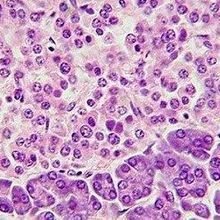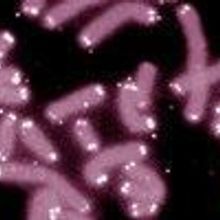Login
Subscribegenetics & genomics, cell & molecular biology

Week in Review: April 7–11
Tracy Vence | Apr 11, 2014 | 3 min read
Stress and telomere length in children; osmotic channel protein identified; amoeba nibbles, then kills cells; amphetamine and mental disorder risk; news from AACR

Key Osmotic Channel Protein Identified
Rina Shaikh-Lesko | Apr 10, 2014 | 3 min read
A little-studied protein appears to be a critical part of the perplexing channel that prevents cells from bursting.

Week in Review: March 31–April 4
Tracy Vence | Apr 4, 2014 | 3 min read
Transcriptional landscape of the fetal brain; how a parasitic worm invades plants; difficulties reproducing “breakthrough” heart regeneration method; oxytocin and dishonesty

Week in Review: January 27–31
Tracy Vence | Jan 31, 2014 | 3 min read
Stimulus-triggered pluripotency; antioxidants speed lung tumor growth; the importance of seminal vesicles; how a plant pathogen jumps hosts

Week in Review: January 20–24
Tracy Vence | Jan 23, 2014 | 3 min read
Mistimed sleep disrupts human transcriptome; canine tumor genome; de novo Drosophila genes; UVA light lowers blood pressure; aquatic microfauna fight frog-killing fungus

Top Scientists of 2013
Tracy Vence | Dec 24, 2013 | 3 min read
The Scientist commemorates prize-winning life scientists and remembers notable researchers who died this year.

Week in Review: December 16–20
Tracy Vence | Dec 20, 2013 | 4 min read
Sex lives of early hominins; Amborella trichopoda genome; surface topography and stem cells; how HIV weakens immune cells; dogs, dust microbes, and mouse allergies; news from ASCB

Week in Review: December 9–13
Tracy Vence | Dec 13, 2013 | 3 min read
Animal family tree rearranged; how E. coli evades the immune system; pharmacological chaperones and misfolded proteins

Gut Bacteria Vary with Diet
Jef Akst | Dec 13, 2013 | 2 min read
Extreme diets can alter the microbial makeup of the human GI tract, and change the behavior of those bacteria.

Week in Review: December 2–6
Tracy Vence | Dec 6, 2013 | 3 min read
Oldest hominin DNA sequence; visualizing dyslexia; testing CRISPR; cancer and autoimmunity

Week in Review: November 18–22
Tracy Vence | Nov 22, 2013 | 4 min read
Chilly mice develop more tumors; gut bacteria aid cancer treatment; two Y chromosome genes sufficient for assisted reproduction; HIV’s “invisibility cloak”

Two-time Nobel Laureate Dies
Abby Olena, PhD | Nov 20, 2013 | 2 min read
Frederick Sanger, who pioneered amino acid and DNA sequencing techniques, has passed away at age 95.

Don’t Fear DIYbio
Jef Akst | Nov 19, 2013 | 2 min read
Biological tinkerers are not the risk that some have made them out to be, according to a new report.

Mislabeled Microbes Cause Two Retractions
Ed Yong | Oct 10, 2013 | 5 min read
Two papers on plant immunity have been retracted, and questions remain about others with similar results.

Fighting Viruses with RNAi
Ruth Williams | Oct 10, 2013 | 3 min read
The long-debated issue of whether mammals can use RNA interference as an antiviral defense mechanism is finally put to rest.

Gene Therapy Coming of Age?
Dan Cossins | Jul 11, 2013 | 4 min read
Using lentiviral vectors to replace mutated genes in blood stem cells, scientists successfully treat two rare diseases apparently without causing harmful side effects.

Opioid Receptors Implicated in PTSD
Dan Cossins | Jun 7, 2013 | 2 min read
A compound that targets a particular opioid receptor in the amygdala reduces the formation of PTSD-like systems in mice subjected to severe trauma.

Muscle Disease Gene Identified in Fish
Ed Yong | Jun 4, 2013 | 3 min read
Scientists discover gene behind an inherited muscle disorder by studying zebrafish embryos.

Gene Transfer Beats Some Flu Strains
Dan Cossins | May 31, 2013 | 2 min read
Mice and ferrets are protected from several deadly viruses when genes encoding “broadly neutralizing antibodies” are delivered into their nasal passages.

Telomeres Affect Gene Expression
Ed Yong | May 5, 2013 | 3 min read
As telomeres shorten with age, genes as far as 1,000 kilobases away could be affected, including one responsible for an inherited muscle disease.